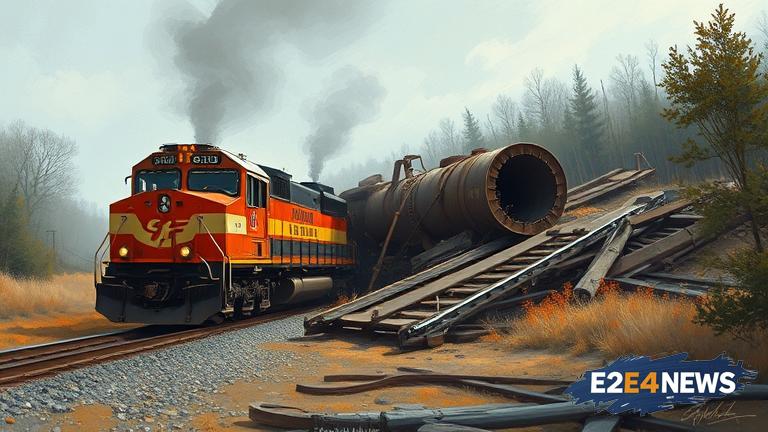The recent train derailment in Ohio has sent shockwaves across the nation, with the Environmental Protection Agency (EPA) facing intense scrutiny for its handling of the disaster. According to reports, the EPA had prior knowledge of the potential risks associated with the train’s cargo, which included hazardous materials such as vinyl chloride and butyl acrylate. Despite this knowledge, the agency failed to take adequate measures to prevent the disaster, which has resulted in the release of toxic chemicals into the environment. The derailment, which occurred on February 3, 2023, involved a train carrying a cargo of hazardous materials, including vinyl chloride, a known carcinogen. The train’s operator, Norfolk Southern, has faced criticism for its handling of the incident, with many questioning the company’s safety protocols and emergency response procedures. The EPA has also faced criticism for its response to the disaster, with some accusing the agency of downplaying the severity of the incident. The agency’s handling of the disaster has sparked widespread concern and outrage, with many calling for greater transparency and accountability. The incident has also raised questions about the safety of the nation’s rail network and the need for greater regulation of the transportation of hazardous materials. In the aftermath of the disaster, local residents have reported a range of health problems, including headaches, nausea, and respiratory issues. The long-term effects of the disaster on the environment and public health are still unknown, but experts warn that the release of toxic chemicals could have devastating consequences. The EPA has announced plans to conduct a thorough investigation into the incident, but many are skeptical about the agency’s ability to hold itself and others accountable. The incident has also sparked a national debate about the need for greater investment in the nation’s infrastructure and the importance of prioritizing safety and environmental protection. As the investigation into the disaster continues, one thing is clear: the EPA and other regulatory agencies must do more to prevent such disasters from occurring in the future. The agency must also be more transparent and accountable in its handling of environmental disasters, and must prioritize the safety and well-being of local communities. The incident has also highlighted the need for greater public awareness and education about the risks associated with the transportation of hazardous materials. Furthermore, the disaster has sparked calls for greater regulation of the rail industry and the need for more stringent safety protocols. The EPA’s handling of the disaster has also raised questions about the agency’s relationship with the rail industry and the potential for conflicts of interest. In addition, the incident has highlighted the need for greater investment in emergency response and disaster preparedness, as well as the importance of prioritizing environmental protection and public health. The long-term consequences of the disaster will likely be felt for years to come, and it is imperative that the EPA and other regulatory agencies take immediate action to prevent similar disasters from occurring in the future. The incident has also sparked a renewed focus on the importance of environmental protection and the need for greater accountability and transparency in the handling of environmental disasters. Ultimately, the EPA’s handling of the Ohio train derailment will be remembered as a catastrophic environmental disaster that could have been prevented with greater foresight and planning. The agency’s response to the disaster will be closely watched in the coming months and years, and it is imperative that the EPA prioritizes the safety and well-being of local communities and the environment. The incident has also highlighted the need for greater international cooperation and coordination in the handling of environmental disasters, as well as the importance of prioritizing environmental protection and public health in the face of emerging global challenges. As the world watches the aftermath of the Ohio train derailment, one thing is clear: the need for greater accountability, transparency, and environmental protection has never been more pressing.
